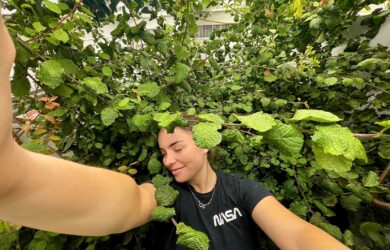
Ivan Rajic on growing up in Serbia in the 1990s and how this affected his research on the economic roots of nationalism.
In 1999, NATO bombs rained down on Belgrade, hitting various targets including a TV centre just 300 metres from Ivan Rajic’s flat.
His mother lived in fear that a neighbouring newspaper office would be next on the list. His father, meanwhile, was documenting the situation in a daily diary for a Norwegian newspaper. The series of articles was later published as a book, which Ivan has just translated into Serbo-Croat. The diary details his father’s views on a war which he believed had much more to do with conflicts between elite groups in Kosovo, Serbia and the West, than with ethnic hatred.
Ivan’s father, Ljubisa Rajic, died two years ago, but his ideas and influence helped shape Ivan’s political views and his interest in nominally nationalist struggles in Europe today. For his PhD he is focusing on how different levels of regional development within countries can form the basis for independence movements. He is looking in particular at the recent referendum on Scottish independence.
Ivan [2009], who was born in Belgrade, was brought up in a house full of politics and ideas. His father, who founded the Department of Scandinavian Studies at the University of Belgrade, was always very politically active. He was a leading member of the Association for Yugoslav Democratic Initiative, one of the first democratic parties after the introduction of multi-party democracy in Yugoslavia in the late 1980s. Although he became disillusioned by party politics by the mid-1990s, he remained an outspoken public intellectual. Ivan’s mother, a retired meteorologist, shared the same views as his father.
“Politics was always a topic in our house,” says Ivan. His father was a leftist and an atheist, who saw the Yugoslav wars as a conflict between elites, who used nationalism and religion to further their aims. Ivan was taught not to sing nationalist songs and he refused to cross himself on school trips to monasteries or churches of cultural importance. He had a strong sense of what he believed in and that he should stand up for this no matter how different it made him.
The conflict in the former Yugoslavia affected him in other ways too. During primary school Dalida, a refugee from Sarajevo, came to live with the family. At the time, the Serbian government had a programme of allocating Bosnian refugees to families who had extra space in their homes. Ivan’s family volunteered to take someone in. Dalida came from an ethnically mixed marriage, and her father, an ex-army officer, had been tortured. Ivan says that she left when he was around 10 and before he had developed much political awareness, but by 13 and 14 he had started to become interested in what was going on around him and particularly in the history of Yugoslavia, even though he could scarcely remember it as a country.
Having a father who was a professor and public intellectual and being surrounded at home by around 7,000 mostly non-fiction books gave Ivan a significant advantage in his education. Moreover, although the education system in Serbia deteriorated during the 1990s, Ivan was able to take private lessons when he needed them thanks to the fact that his father had won a cultural prize in Sweden in the early 1990s. This allowed the family to live through the hyperinflation of that era and later gave Ivan’s father opportunities to earn money on the side, such as through translating and holding lectures abroad. “You can’t escape the fact that your background has a tremendous impact on what you can achieve. I probably wouldn’t be here today had I come from an average family, especially in Serbia,” says Ivan.
Social science
At 17 he went on an exchange to Norway where, despite having opted to focus on sciences in his school in Serbia, he chose a range of social sciences courses, including economics and sociology. This was to prove a turning point for him. When he returned to Belgrade he investigated social science courses at several faculties, settling on economics, and deciding even before he started his course that in his second year he would choose a module focused on economic analysis and policy. His progress was inspired by the support of several of his lecturers, particularly Professor Bozo Stojanovic. Ivan says: “I, and another colleague of mine, probably progressed as much with his support in one term as we did in all of our previous years of study. Professors really don’t get better than that. Perhaps someone can be equally good, but I doubt they can be better. Simply put, I don’t think we can ever repay our debt to him.”
During his studies, Ivan helped organise talks for the Department for Business Cooperation of the Student Alliance of Belgrade which helped him compare the views of politicians, policy makers and business people with what he had learned both inside and outside of his curriculum. A particularly important comparison was with the ideas he got from a book on economic development, How Rich Countries Got Rich and Why Poor Countries Stay Poor, by the Norwegian economist Erik Reinert. His father had brought him the Norwegian original from one of his trips to Norway.
That book was to prove very influential in Ivan’s thinking on economics. “It was critical of two things. One is the flawed notion that economic development comes spontaneously from free markets. The other is the fact that one school of thought is dominant in economics – neoclassical economics – and that it has narrowed down economics to mathematical modelling. I still consider it one of the best books in economics I’ve read, and at the time, it also appealed to the rebel in me,” says Ivan. He translated the book into Serbo-Croat soon after he got it.
Cambridge
Ivan finished his undergraduate course in 2009 after having already started to work as a junior economist in a think tank in Belgrade. With his interest in economic development still strong, he began looking at master’s courses in development studies. He decided to apply to Cambridge after finding out that both Ha-Joon Chang and Tony Lawson were teaching there. The former, now Ivan’s PhD supervisor, is one of the world’s leading experts in development, the latter in economic methodology. “I thought it would be the perfect mix, to be taught by Ha-Joon Chang in my MPhil, and to be able to attend workshops organised by Tony Lawson,” says Ivan. “I applied only to Cambridge. It’s a good thing I had no idea whatsoever how difficult it is to get in and even more to get a scholarship. Otherwise, I would have been nervous at my interview. Luckily, it all worked out.” Ivan was accepted and started his MPhil in Development Studies in 2009 and applied to do his PhD soon after, although he took time out of the latter when his father became ill and subsequently died.
Ivan wasn’t sure initially what he wanted to research for his PhD. His first idea was to explore some of the inefficiencies in the former Yugoslav economic (workers’ self-management) system, the explanations for which he thought had been oversimplified by some as being down to the fact that it was not capitalist enough. However, his interests soon moved on to the varied regional economic effects of the dissolution of Yugoslavia. Finally, he joined that up with his long-standing interests in the root causes of the Yugoslav wars.
“If you grow up in any of the post-Yugoslav republics, you hear all the time how the economy was inefficient, how workers’ self-management was a stupid idea, how it was wrong to industrialise,” he says. “But, all that makes little sense. Just for starters, why is the IMF austerity programme imposed on Yugoslavia in the 1980s excluded from any analysis of Yugoslavia’s economic problems? You also hear all the time how the Yugoslav wars were about ethnicity and religion. But what caused the war was the domestic elites manipulating people into hating and fearing each other, combined with a very healthy dose of Western elites engaging in divide-and-conquer imperialism. So, you have two areas – politics and economics – that are, of course, connected, but severly misunderstood. I thought that perhaps if they were analysed in a better way, a real connection could be seen.”
Ivan’s supervisor suggested he focus on a more current topic, however, and he initially wanted to apply his ideas to the European Union. But, in his first year report viva, he was advised that he needed to focus more. He suggested Catalonia, but then Professor Peter Nolan, his other first year report examiner, suggested Scotland, which was at the time preparing for its referendum on independence from the UK. “He was completely right – my English is far better than my Spanish, Scotland is nearer, the data is easily accessible, I can make contacts more easily,” says Ivan. Over the last year, Ivan has been to Scotland several times to interview people and to attend conferences and political talks. He sees the roots of the latest move towards independence in Scotland as being economic and originating from the neoliberal slant that the UK has taken over the last several decades, which has heavily impacted most areas (Scotland included) outside of the South East.
“There are many parallels between Scotland and the UK, Catalonia and Spain, Quebec and Canada, Singapore and Malaysia, Yugoslavia, the Soviet Union, and a host of other examples,” says Ivan. “In all those cases, the trail leads back to certain similarities in the political economy of the countries in question. We need to understand how and why such moves towards independence happen. Because, as a number of examples show, the country where I was born included, things can end up in a very, very bad way.”
Picture credit: Wiki Commons.












